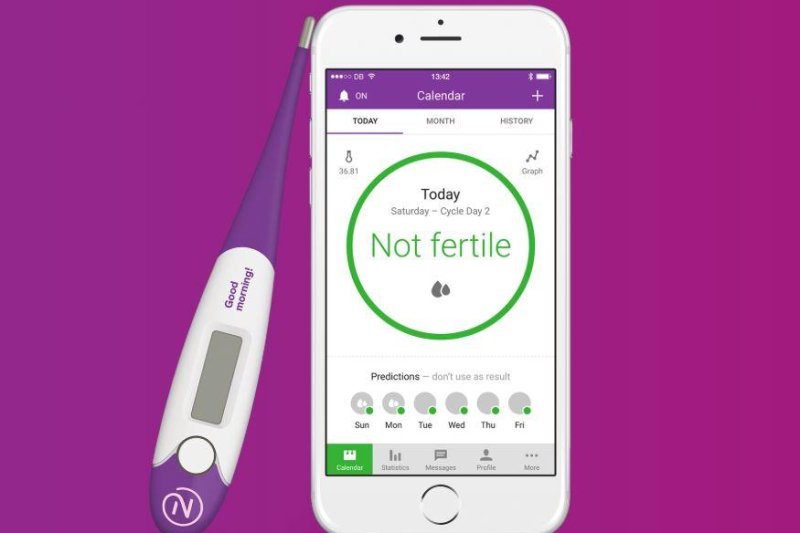Natural Cycles is a mobile app that can assist as a contraception method by monitoring a woman's fertile and infertile days each month using temperature and menstrual cycle data. Photo courtesy of
Natural Cycles Nordic AB
Aug. 13 (UPI) -- The U.S. Food and Drug Administration for the first time has approved marketing of a mobile app as a contraception method to prevent pregnancy.
Natural Cycles, which is intended for use in pre-menopausal women aged 18 and older, contains an algorithm that calculates days of the month a woman is likely to be fertile. It is based on daily body temperature readings and menstrual cycle information.
"Consumers are increasingly using digital health technologies to inform their everyday health decisions, and this new app can provide an effective method of contraception if it's used carefully and correctly," Dr. Terri Cornelison, assistant director for the health of women in the FDA's Center for Devices and Radiological Health, said in a press release Friday. "But women should know that no form of contraception works perfectly, so an unplanned pregnancy could still result from correct usage of this device."
The app costs $79.99 per year and includes an oral basal thermometer, according to the website of the company, Natural Cycles Nordic AB.
To use the app, women take their temperature each day when they wake up and enter the reading into the app.
The FDA says women using the app for contraception should abstain from sex or use protection when they see "use protection" displayed on the app. This means they're more likely to be fertile on those days.
In clinical studies, 15,570 women used the app for an average of eight months. The app had a "perfect use" failure rate of 1.8 percent. The perfect use rate is the percentage of women who would become pregnant because of intercourse on a day the app predicted they would not be fertile, or their contraceptive method failed during intercourse on a fertile day.
The "typical use" failure rate was 6.5 percent for women sometimes not using the app correctly, including unprotected intercourse on fertile days.
The typical use fail rate for an IUD is 0.2-0.8 percent, according to the Centers for Disease Control and Prevention.
The app is not recommended for women with a medical condition where pregnancy would be associated with a significant risk to the mother or the fetus. Or those currently using birth control or hormonal treatments that inhibit ovulation.
The app was reviewed through the de novo premarket review pathway, a streamlined process for novel, low-to-moderate-risk devices of a new type.
Natural Cycles Nordic AB is based in Switzerland. It was developed by a physicist couple, Elina Berglund and Raoul Scherwitzl, who sought an effective method of natural contraception.
In January, Business Insider reported, 37 women in Sweden said they got pregnant while using it as contraception, though researchers say the pregnancies occurred because users did not follow what the app said.
Also Friday, the FDA approved the first vaginal ring contraceptive that can be used for an entire year.
Annovera, which is a combined hormonal contraceptive for women of reproductive age, is a reusable doughnut-shaped, non-biodegradable ring that is placed in the vagina for three weeks followed by one week out of the vagina. This schedule is repeated every four weeks for one year.
In clinical trials, about two to four women out of 100 women became pregnant during the first year they use Annovera.















